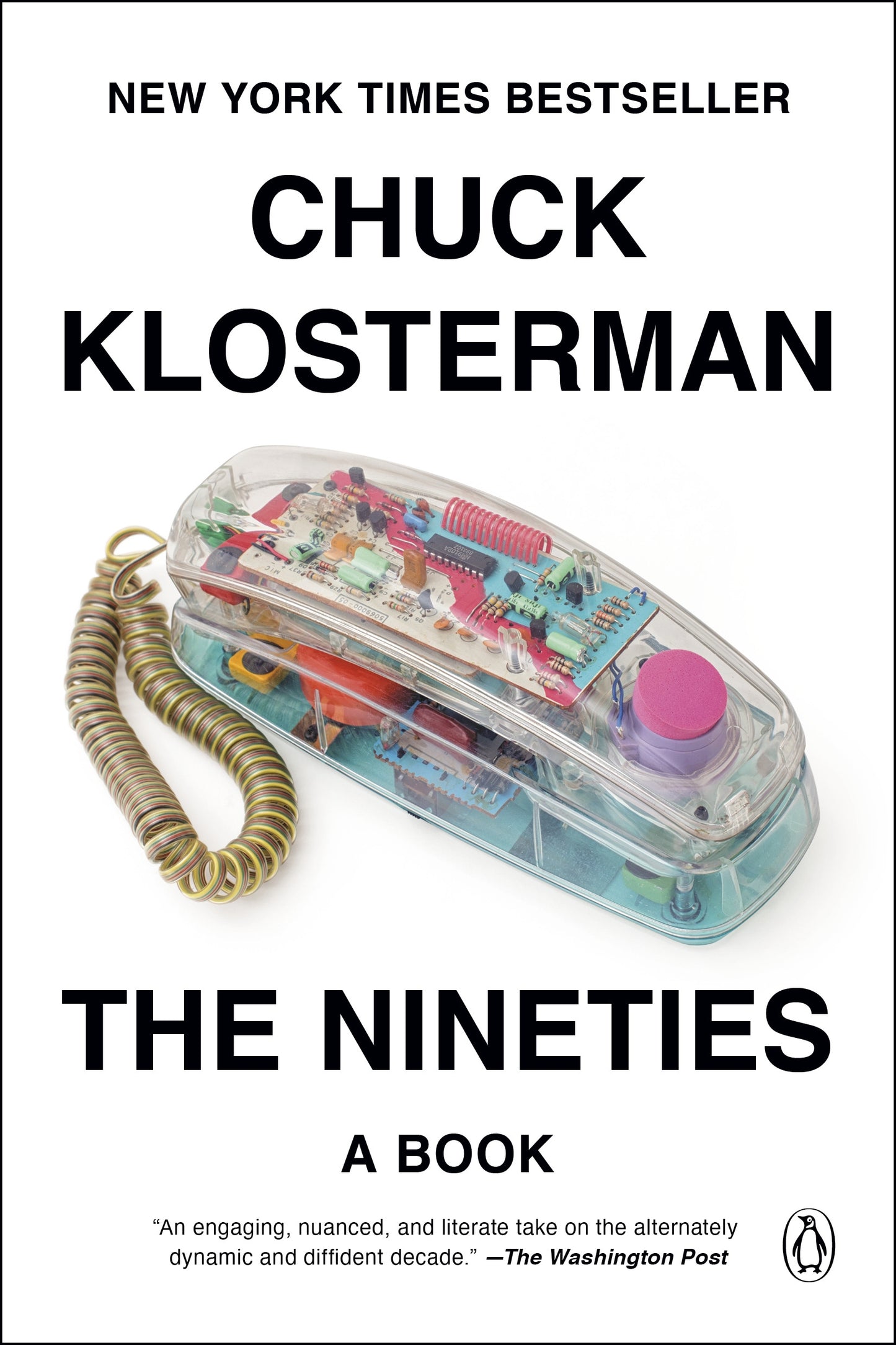Chuck Klosterman
The Nineties
The Nineties
Couldn't load pickup availability
To order this book, please email us at orders@lanebook.com.au or give us a call at (09) 9384 4423
Gabi's Review
Chuck Klosterman’s new book The Nineties is a lot of fun. This decade is most significant for the arrival of the internet, which radically changed the way we communicate and conduct business. The book reads like a pandora’s box of cultural touchstones that invite refection on the decade’s identity. Its references cover music, film, television, technology and news events, all of which are explored with hilarity and without the easy temptation of nostalgia. It’s the movie of the lives of Gen Xs.
Klosterman’s cultural cornerstone is the rock band Nirvana’s iconic 1991 album Nevermind, which he cleverly reveals marked a shift toward valuing “authenticity” in pop culture. Grunge, with its flannel-clad rejection of 80s gloss, becomes a symbol of the decade’s obsession with being “real.” Bands like Pearl Jam and Soundgarden framed their rise as a collective middle finger to an industry hungry to co-opt their rebellion. However, the mainstream success of such bands ironically undercut that very ethos of non-conformity; Klosterman reveals this as a singular 90s tension between sincerity and commodification.
He also pits two 1994 cinematic hits, Quentin Tarantino’s Pulp Fiction and Robert Zemeckis’ Forrest Gump, to further highlight the decade’s cultural schizophrenia. Pulp Fiction, with its nonlinear swagger and hyper-stylized violence, embodies the 90s embrace of irony and postmodern cool. By contrast, Forrest Gump, with its earnest, sentimental sweep through history, reflects a lingering desire for uncomplicated heroes. Klosterman uses this rivalry (notably the movies’ Oscar showdown) to argue that the decade couldn’t decide whether it wanted to smirk or cry; a duality that mirrors its broader identity crisis.
Klosterman’s take on Seinfeld is characteristically sharp. He zeroes in on the “show about nothing” as the ultimate expression of the decade’s ironic detachment. Jerry, Elaine, George, and Kramer’s petty obsessions, soup Nazis and close-talkers, become a microcosm of a culture that revelled in triviality while the world shifted beneath it. Klosterman ties this to the economic boom and relative stability of the 90s; with no grand wars or upheavals to fixate on, TV could afford to fetishise the mundane. He contrasts this with The X-Files, which tapped into latent paranoia about government and technology, suggesting a decade simultaneously coasting and simmering with unease.
References to VHS tapes and Blockbuster Video are less about tech specs and more about a lost way of life lingering on the tactile ritual of renting a movie; the late fees, the rewinding, and garish store carpets as a cultural artifact embodying consumption as deliberate if gloriously inefficient! He argues that such objects and experiences reflect the 90s as the last decade before the internet rewired how we consume culture. He pairs this with early internet references AOL dial-up and Netscape to underscore a tipping point: a time when technology was still a novelty, not a necessity, and when people didn’t see its imminent dominance. Offbeat references like Zima add another layer to Klosterman’s argument. This water-clear malt beverage (I assume it’s a US phenomenon) briefly captivated drinkers and epitomised the decade’s taste for fleeting trends and artificial novelty, in which the absurd and the earnest rubbed shoulders.
While the book verges at times on navel-gazing, and the US centric lens tends to narrow its scope, Klosterman’s interrogation of cultural milestones uses a delightfully contrarian twist. He argues, for example, that the movie Titanic’s bloated runtime mattered more than its romance, or that the Macarena’s ubiquity revealed a collective willingness to embrace nonsense. His references are springboards for a bigger idea: how the 90s shaped our current world, often in ways its inhabitants didn’t notice. The book reflects a belief that the 90s were defined by paradox; a decade that felt inconsequential yet set the stage for everything that followed. It reveals that culture isn’t static, but a messy, living thing we only half-understand as it’s happening.
I can recommend this entertaining memoir. Hindsight is the best teacher, but it always hands you the syllabus after the final exam. Have fun spotting what you missed!
Publisher's Review
From the author of But What if We're Wrong comes an insightful, funny reckoning with a pivotal decade.
An instant New York Times bestseller!
"Informative, endlessly entertaining." - BuzzFeed
"Generation X's definitive chronicler of culture." - GQ
From the author of But What If We're Wrong comes an insightful, funny reckoning with a pivotal decade.
It was long ago, but not as long as it seems - The Berlin Wall fell and the Twin Towers collapsed. In between, one presidential election was allegedly decided by Ross Perot while another was plausibly decided by Ralph Nader. Landlines fell to cell phones, the internet exploded, and pop culture accelerated without the aid of technology that remembered everything. It was the last era with a real mainstream to either identify with or oppose. The '90s brought about a revolution in the human condition, and a shift in consciousness, that we're still struggling to understand. Happily, Chuck Klosterman is more than up to the job.
In The Nineties, Klosterman dissects the film, the music, the sports, the TV, the pre-9/11 politics, the changes regarding race and class and sexuality, the yin/yang of Oprah and Alan Greenspan, and (almost) everything else. The result is a multidimensional masterpiece, a work of synthesis so smart and delightful that future historians might well refer to this entire period as Klostermanian.
Share


